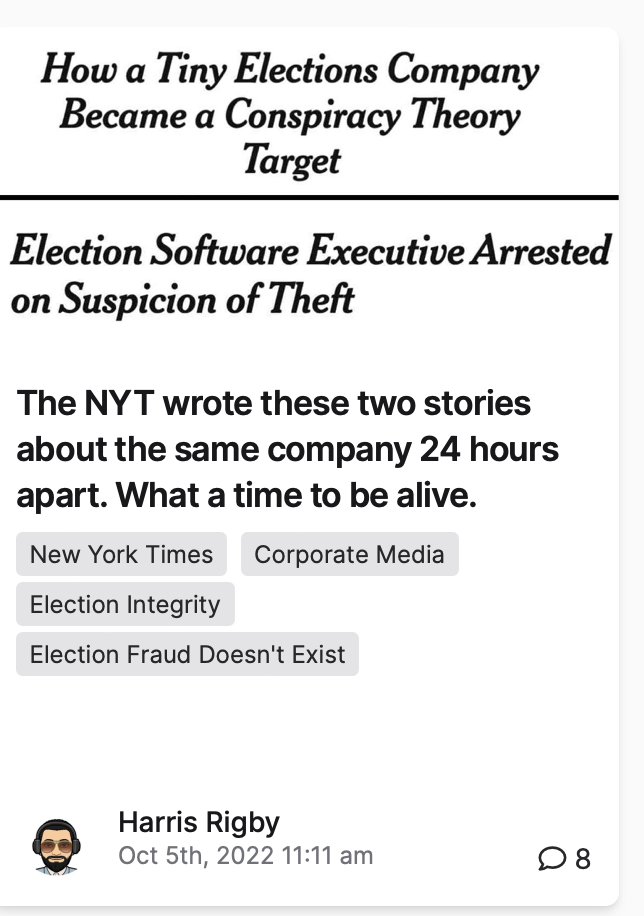Having raced to the bottom and hit it, this former newspaper keeps digging
/NYT: 2022/10/03: How a Tiny Elections Company Became a Conspiracy Theory Target
At an invitation-only conference in August at a secret location southeast of Phoenix, a group of election deniers unspooled a new conspiracy theory about the 2020 presidential outcome.
Using threadbare evidence, or none at all, the group suggested that a small American election software company, Konnech, had secret ties to the Chinese Communist Party and had given the Chinese government backdoor access to personal data about two million poll workers in the United States, according to online accounts from several people at the conference.
In the ensuing weeks, the conspiracy theory grew as it shot around the internet. To believers, the claims showed how China had gained near complete control of America’s elections. Some shared LinkedIn pages for Konnech employees who have Chinese backgrounds and sent threatening emails to the company and its chief executive, who was born in China
…..
Konnech said none of the accusations were true. It said that all the data for its American customers were stored on servers in the United States and that it had no ties to the Chinese government.
If you’re interested, here’s the follow-up story from yesterday:
Election Software Executive Arrested on Suspicion of Theft
The top executive of an elections technology company that has been the focus of attention among election deniers was arrested by Los Angeles County officials
Eugene Yu, 51, was arrested early Tuesday just outside Lansing, Mich., after prosecutors alleged he improperly stored the information on servers in China, according to Los Angeles County Dist. Atty. George Gascón. Yu, who is the chief executive officer of a company named Konnech, is expected to be extradited to Los Angeles in the coming days, Gascón said.
That would be the exact information that Mr. Yu denied were stored in China, eh?
But wait, the editors aren’t done! They also ran this yesterday:
If DeSantis would only have invested state pension funds based on a company's climate policies, then Hurricane Ian would have stayed out to sea?
Hurricane Ian's wrath made clear that Florida faces some of the most severe consequences of climate change anywhere in the country. But the state's top elected leaders opposed the most significant climate legislation to pass Congress — laws to help fortify states against, and recover from, climate disasters, and confront their underlying cause: the burning of fossil fuels.
Senators Marco Rubio and Rick Scott voted against last year's bipartisan infrastructure law, which devotes some $50 billion to help states better prepare for events like Ian, because they said it was wasteful. And in August, they joined every fellow Republican in the Senate to oppose a new climate law that invests $369 billion in reducing greenhouse gas emissions, the largest such effort in the country's history.
At the same time, Republican Gov. Ron DeSantis has blocked the state's pension fund from taking climate change into account when making investment decisions, saying that politics should be absent from financial calculations.
In the aftermath of Ian, those leaders want federal help to rebuild their state — but don't want to discuss the underlying problem that is making hurricanes more powerful and destructive.



